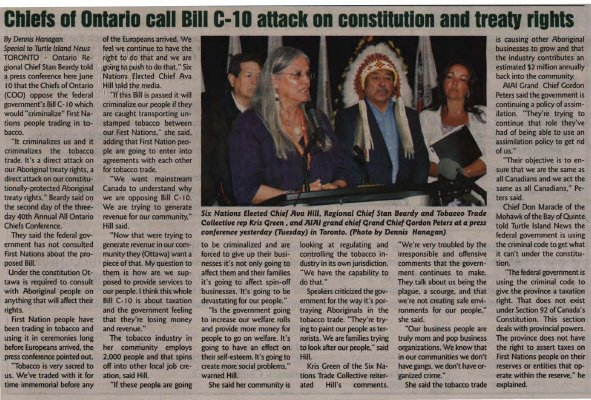"Chiefs of Ontario call Bill C-10 attack on constitution and treaty rights"
- Publication
- Turtle Island News, 11 Jun 2014
- Full Text
- Chiefs of Ontario call Bill C-10 attack on constitution and treaty rightsBy Dennis Hanagan, Special to Turtle Island News
TORONTO - Ontario Regional Chief Stan Beardy told a press conference here June 10 that the Chiefs of Ontario (COO) oppose the federal government's Bill C-10 which would "criminalize" First Nations people trading in tobacco.
"It criminalizes us and it criminalizes the tobacco trade. It's a direct attack on our Aboriginal treaty rights, a direct attack on our constitutionally-protected Aboriginal treaty rights," Beardy said on the second day of the three-day 40th Annual All Ontario Chiefs Conference.
They said the federal government has not consulted First Nations about the proposed Bill.
Under the constitution Ottawa is required to consult with Aboriginal people on anything that will affect their rights.
First Nation people have been trading in tobacco and using it in ceremonies long before Europeans arrived, the press conference pointed out.
"Tobacco is very sacred to us. We've traded with it for time immemorial before any of the Europeans arrived. We feel we continue to have the right to do that and we are going to push to do that," Six Nations Elected Chief Ava Hill told the media.
"If this Bill is passed it will criminalize our people if they are caught transporting unstamped tobacco between our First Nations," she said, adding that First Nation people are going to enter into agreements with each other for tobacco trade.
"We want mainstream Canada to understand why we are opposing Bill C-10. We are trying to generate revenue for our community," Hill said.
"Now that we're trying to generate revenue in our community they (Ottawa) want a piece of that. My question to them is how are we supposed to provide services to our people. I think this whole Bill C-10 is about taxation and the government feeling that they're losing money and revenue."
The tobacco industry in her community employs 2,000 people and that spins off into other local job creation, said Hill.
"If these people are going to be criminalized and forced to give up their businesses its not only going to affect them and their families it's going to affect spin-off businesses. It's going to be devastating for our people."
"Is the government going to increase our welfare rolls and provide more money for people to go on welfare. It's going to have an effect on their self-esteem. It's going to create more social problems," warned Hill.
She said her community is looking at regulating and controlling the tobacco industry in its own jurisdiction. "We have the capability to do that."
Speakers criticized the government for the way it's portraying Aboriginals in the tobacco trade. "They're trying to paint our people as terrorists. We are families trying to look after our people," said Hill.
Kris Green of the Six Nations Trade Collective reiterated Hill's comments. "We're very troubled by the irresponsible and offensive comments that the government continues to make. They talk about us being the plague, a scourge, and that we're not creating safe environments for our people," she said.
"Our business people are truly mom and pop business organizations. We know that in our communities we don't have gangs, we don't have organized crime."
She said the tobacco trade is causing other Aboriginal businesses to grow and that the industry contributes an estimated $2 million annually back into the community.
AIAI Grand Chief Gordon Peters said the government is continuing a policy of assimilation. "They're trying to continue that role they've had of being able to use an assimilation policy to get rid of us."
"Their objective is to ensure that we are the same as all Canadians and we act the same as all Canadians," Peters said.
Chief Don Maracle of the Mohawk of the Bay of Quinte told Turtle Island News the federal government is using the criminal code to get what it can't under the constitution.
"The federal government is using the criminal code to give the province a taxation right. That does not exist under Section 92 of Canada's Constitution. This section deals with provincial powers. The province does not have the right to assert taxes on First Nations people on their reserves or entities that operate within the reserve," he explained.
- Creator
- Hanagan, Dennis, Author
- Media Type
- Text
- Newspaper
- Item Type
- Clippings
- Publisher
- Turtle Island News
- Place of Publication
- Six Nations of the Grand River, ON
- Date of Publication
- 11 Jun 2014
- Date Of Event
- 10 Jun 2014
- Subject(s)
- Personal Name(s)
- Beardy, Chief Stan ; Hill, Chief Ava ; Green, Kris ; Peters, Chief Gordon ; Maracle, Chief Don.
- Corporate Name(s)
- Chiefs of Ontario ; Six Nations Trade Collective ; Association of Iroquois and Allied Indians.
- Local identifier
- SNPL005147v00d
- Language of Item
- English
- Geographic Coverage
-
-
Ontario, Canada
Latitude: 43.65011 Longitude: -79.3829
-
- Creative Commons licence
 [more details]
[more details]- Copyright Statement
- Public domain: Copyright has expired according to Canadian law. No restrictions on use.
- Copyright Date
- 2014
- Copyright Holder
- Turtle Island News
- Contact
- Six Nations Public LibraryEmail:info@snpl.ca
Website:
Agency street/mail address:1679 Chiefswood Rd
PO Box 149
Ohsweken, ON N0A 1M0
519-445-2954




